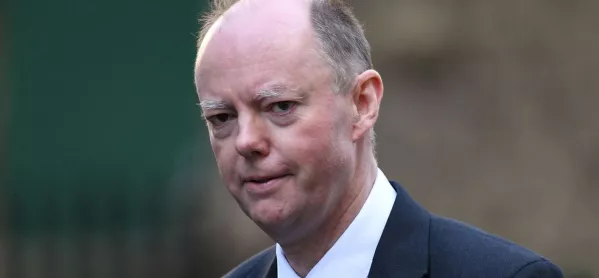The government’s chief medical officer has “categorically” denied claims that he had doubts over the so-called “big bang” approach to reopening schools.
Chris Whitty was responding to a question at today’s Downing Street briefing, during which the prime minister set out his plans for all children to return to school from 8 March.
Professor Whitty said he was “surprised” to read reports last week that suggested he was unhappy with the prime minister’s then-rumoured intention to welcome all pupils back to school at the same time.
Quick guide: School reopenings: What you need to know
SAGE: Opening schools ‘may increase spread of Covid by 50%’
Back to school: The 6 key changes in DfE guidance
The chief medical officer was asked: “It was reported at the weekend that you were unhappy about the ‘big bang’ approach to reopening schools. Can you reassure parents and the wider community that it is safe?”
He responded: “So, I’d like to be reasonably unambiguous on the schools point. I was rather surprised to read what I read in one newspaper and was then reported in others, since I categorically denied it to the journalist involved, but they still printed it, so fine.”
Professor Whitty said he wished to set out “very clearly why this is the case”.
He cited the “huge advantages for children to be at school”, which he said were “overwhelming” and “not in any dispute”.
He added that “if you keep children out of school, every single one of the children you keep out of school is disadvantaged”.
The chief medical officer said that the risk to children from going to school was “incredibly low”, and argued that teaching was “not a high risk profession” when compared to nursing and care home work.
“But I don’t want to diminish that,” he added. “I’m just saying they should be made as safe as possible, including in environments where people aren’t doing face-to-face classroom teaching.”
And Professor Whitty also sought to reassure teachers and the public by saying there are “several things we’re going to be doing this time around on schools, which will take the risk even further down than it has been before”.
“The view is, as things are falling down rapidly at the moment, there is some headroom to go ahead, and the first priority, as the prime minister has repeatedly said, is for schooling and I think everyone would agree with that,” he said.
“We have a natural firebreak at the Easter holidays. And we’ve got these five weeks to work out how things are going.
“So there’s a large number of insurances built in, and there’s several things we’re going to be doing this time around on schools, which will take the risk even further down than it has been before, including greater use of testing, the wider use of masks and a whole variety of other things, which have been incredibly supported by many in the teaching professions.”
He added: “And I really would like to pay a huge tribute to what teachers have done over the whole period because they’ve kept schools going for children of key workers all the way through, including the absolutely worst of times, and they’ve done that because they believe so strongly in education, as all of us do.”
